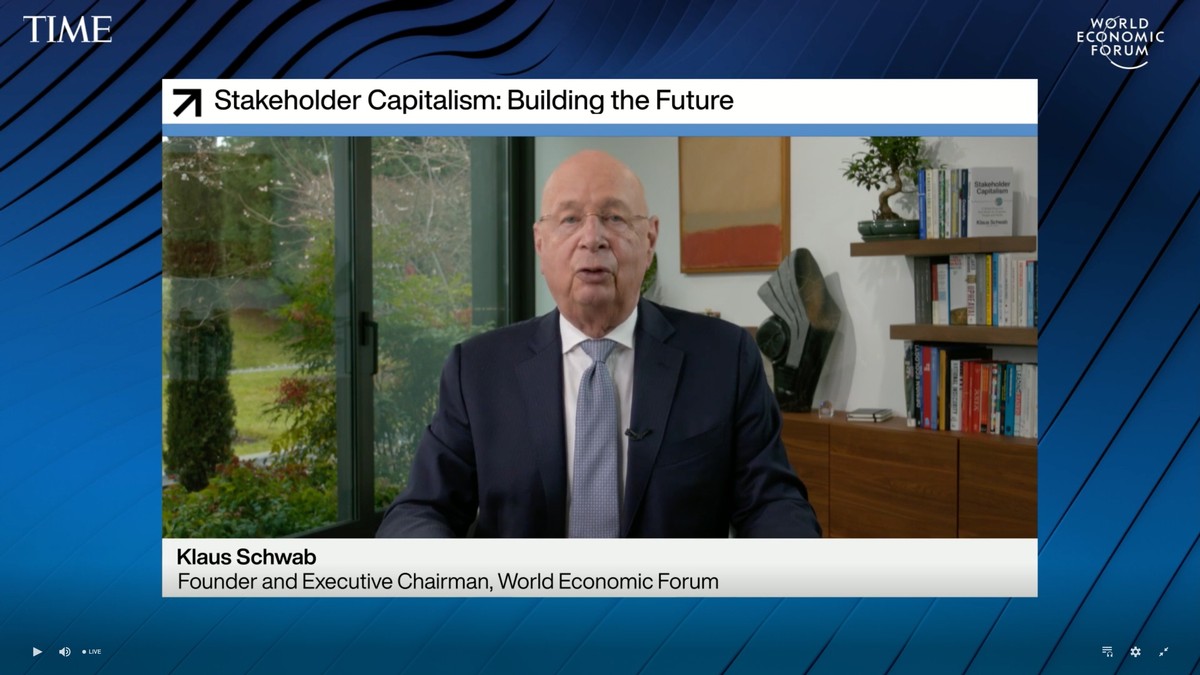Well-Timed Virtual Davos Conference Is Here to Solve COVID At Last

It’s the most wonderful time of the year: the World Economic Forum (WEF) is starting up again. Each year, we are treated to a few days of the world’s most powerful people, their stenographers, and a few critics who slip through the cracks arguing over the newest narrative to preserve capitalism.
Last year, the annual conference held at Davos in January featured billionaires warning that capitalism was dying and corporations needed a new purpose, a nearby airport offering “green” fuel alternatives for private jets traveling to the event, and thousands of posts across social media made in a lab to make Davos’ messaging viral.
Advertisement
A lot has changed since January 2020. A deadly global pandemic has taken hold, for one, leading to mass unemployment, evictions, and food insecurity. How should the global elite respond to such circumstances? With a virtual Davos conference, of course, which kicked off on Monday.
This Zoom call from Hell is being positioned as a series of “high level” dialogues where leaders will expand on the central theme of a “great reset” to fix the problems of our pandemic-stricken world. Ironically, the WEF is also planning a special in-person meeting in Singapore in May, and predictably there’s a lot of resistance to the idea, since it could well be a COVID-19 superspreader event.
“The COVID-19 crisis has shown us that our old systems are not fit any more for the 21st century,” said WEF founder and executive chairman Klaus Schwab in the WEF’s Great Reset podcast.
Davos can be understood as an attempt to reinvent capitalism and rescue it from collapse rooted in falling profits, poor returns on investments, and a stagnant global economy. It’s also a PR exercise in making it seem like capitalists are interested or capable in solving the problems facing common people, and in that regard it is absolutely painful to see Davos try and address COVID-19 or the uprisings stemming from the killing of George Floyd by police.
Advertisement
One Monday panel on COVID-19 was mainly focused on health and featured panelists such as Nancy Brown, CEO of the American Heart Association, and Anthony Fauci. Another later in the day, however, featured a YouTube executive, the CEO of meditation app Calm, and mental health YouTubers to discuss “how the online community has been critical to improving dialogue around mental health.”
In the loftily-titled section “Delivering Social Justice in the New Economy,” the chief executive of accounting firm Ernst & Young and the chairman of Bloomberg (both white men) both took a moment to praise their companies’ own internal diversity initiatives. Tatiana Clouthier, Mexico’s Minister of the Economy, espoused the importance of re-skilling women for e-commerce.
Some of WEF’s efforts are serious—the WEF’s Great Reset initiative involves earnest attempts at planning and discussion by some of the world’s largest corporations and international organizations—but most should come with a giant asterisk as the WEF is still wedded to fantastical narratives about what is possible, or actually happening, within capitalism.
One plank of the WEF program for Monday included building “fairer economics”, the subject of numerous talks concerning economic growth, “pathways” for economic transformation, and “resetting” digital currencies. The Davos Agenda report on ride-hailing falls under that vision, claiming that companies like Uber and Lyft are causes for optimism because they promise to electrify their fleets. Ride-hail vehicles are high-mileage, the WEF notes, meaning “electrifying one can have the same emissions reduction benefits as electrifying three passenger vehicles.” This, Davos maintains, “is possible” if for no other reason than the fact that the companies have promised that it is so.
There are strong reasons to believe this won’t come to pass, chiefly that Uber doesn’t plan to do anything to make it happen except push more costs onto drivers. The company plans to partner with manufacturers to offer deals on cars to drivers, but that amounts to yet another investment just to get started with Uber. Uber will also charge riders more money for “green” rides, in theory making driving an electric vehicle more lucrative.
In the report, however, Davos admits that responsibility for this promise will fall on everyone from ”municipalities, EVSE providers, utilities, regulators and [ride-hail companies] themselves.” It is only through the work of these civil organizations, as opposed to the promises of the ride-hail companies and their own efforts, that there is any hope of making electric vehicles cheap, charging infrastructure widely available, and emissions down.
It’s worth noting that the Great Reset’s sweeping, optimistic vision has become fertile ground for conspiracy theories. This is ironic because, as Naomi Klein pointed out, such capitalist-utopian thinking is itself a pablum designed to obscure Davos’ purpose to “liberate capital from all encumbrances” such as regulations, taxes, and so on. This year it’s the “Great Reset,” and before that it was “Shaping the Post-Crisis World” and “The Great Transformation.”
In 2021, as the world continues to literally burn, Davos is a waste of time that should be understood as the newest attempt to add a shiny glean to moonshots that will preserve the worst elements of capitalism while sharing more of the bounty in a bid to stave off revolts and backlash.
*** This article has been archived for your research. The original version from VICE can be found here ***


